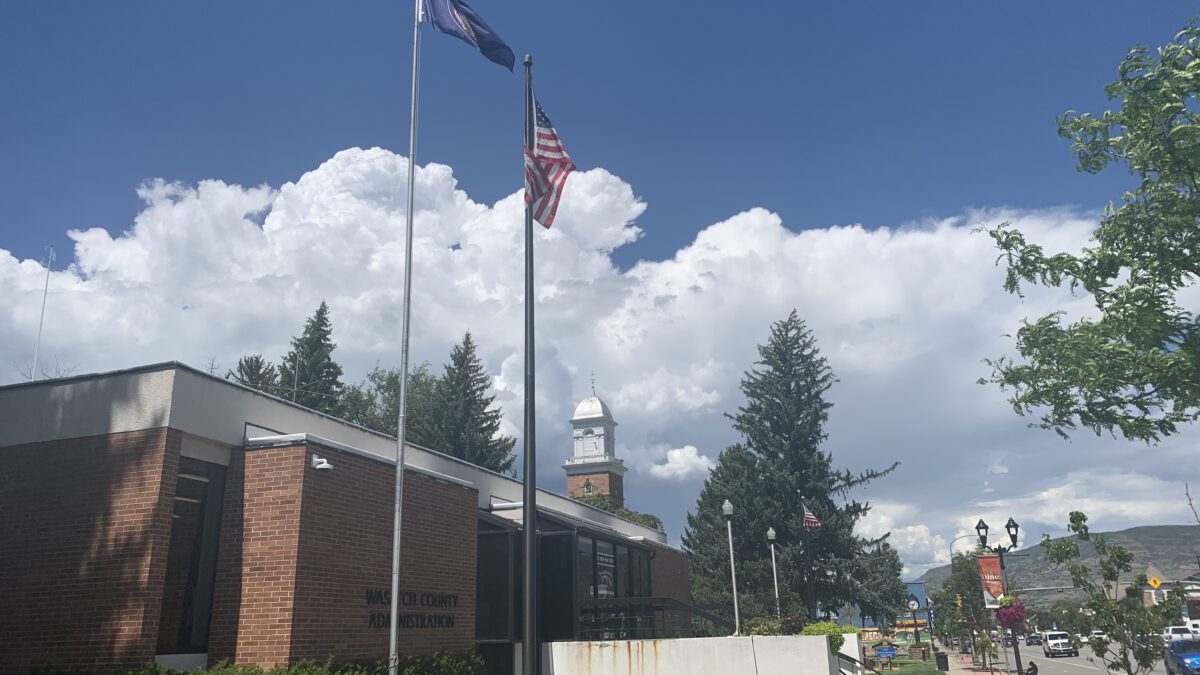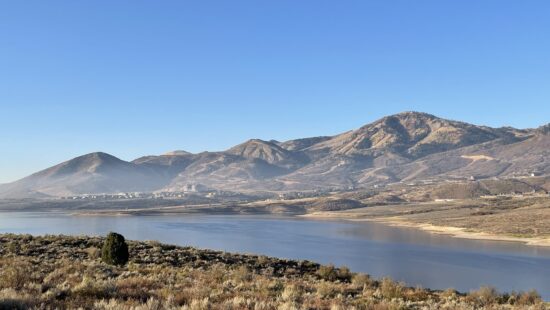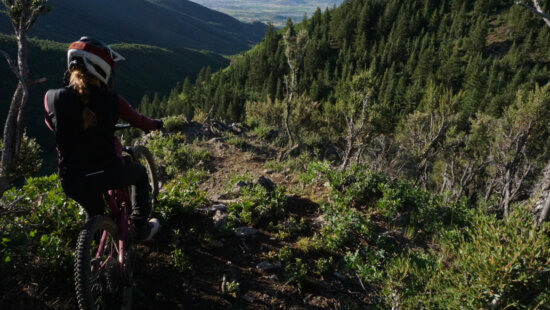Town & County
Fire at Will: Wasatch County manager Dustin Grabau

The Wasatch County Administration Building. Photo: TownLift // Will Scadden
WASATCH COUNTY, Utah – In this informative and reoccurring series I will be conversing and partaking in insightful discussions with various elected officials and important people in the state of Utah. Through these conversations, I intend to explore the core of their roles, shedding light on the significant responsibilities and duties that come with public office.
Throughout this series, we will also delve into their viewpoints on critical issues affecting their constituents and the efforts they have made to address these concerns and promote advancement within their communities.
This week I spoke with Dustin Grabau, the County Manager for Wasatch County.
Grabau is originally from Texas, and he moved to Utah to attend Brigham Young University in 2009. Grabau eventually earned two degrees from BYU, an undergrad degree in economics and a master’s degree in public administration with an emphasis on local government management.
With the aim of focusing on local government, Grabau pursued a degree in public administration. While studying at BYU, he gained experience as an intern in Provo City, serving under former Provo Mayor and now Congressman John Curtis.
After graduating and completing his internship, Grabau returned to work for Provo City, starting in the energy department and eventually transitioning to the budget officer for the city.
After working in Provo for six years, Grabau and his family moved over the mountains to Wasatch County, where he has worked as the county manager for the past four years.
Grabau has always wanted to work in local government, and the county manager position is the perfect medium for him to achieve this goal.
“What attracts me to local government is the variety of issues that we deal with. As a county manager, I’m dealing with personnel issues, public policy issues, financial issues, service optimization. It’s very diverse, and I like to dabble in lots of things,” Grabau said of his desire to work in local government. “We’re dealing with important and meaningful topics, but actually in a way that has a really immediate impact.”
“I find that higher levels of government at the state and federal levels, you’re dealing with important issues, but they’re abstracted from a higher level and it’s harder to see progress and harder to measure success. Whereas local government, this is where rubber meets the road. We actually build things and do meaningful stuff, and every year there’s there’s new exciting policies to consider that impact our community.”
In Wasatch County, the county manager position is unelected, but is hired and appointed by the County Council members. While the county manager does not vote or decide policies, they are in charge of executing them and administering the budget, which Grabau says are two of his main responsibilities.
“The biggest roles are the administrative aspects of the county, our personnel management, budget administration, and executing public policies. The budget is a big part of executing policies because the council sets how they want to fund different programs, and then we try to take those funds and produce outcomes with them,” Grabau said of his main roles and responsibilities of being county manager. “I think that it’s really executing on the vision that the council has for our community.”
“There’s a lot of work that falls under my purview. I do a lot of coordination with the elected officials, there’s a lot of elected officials that are over different departments. So I coordinate with those elected officials and provide services to them. I help with internal services such as HR, coordinate legal services across departments, and facilitate cross department collaboration. For example, the tax system goes through from the surveyor, to the recorder, to the assessor, to the clerk auditor, and finally to the treasurer, and I make sure that that all flows through correctly.”
While not necessarily a politician, as Grabau does not need to campaign or earn the public vote, the county manager is still entrenched in local politics, something that Grabau tries to stray away from.
“I’m about as close as you can get to a politician without actually being one,” Grabau said. “I really try to defer to the council and draw a line between myself and political and policy decisions. My role is to inform the council about the consequences of a wide array of policy choices, and I might propose options for how we could do it, try to explain the consequences of those different options, but ultimately, they’re the ones who decide what we do, and my role is to execute those decisions.”
“Part of all county managers code of ethics is to remain politically neutral, and to make sure we don’t engage in the process, endorse candidates, or do public displays for candidates. We’re really trying to be the neutral party that has credentials to be able to execute the vision.”
Grabau sits in on council meetings, but only to advise council members and to answer questions related to administrative and budget issues.
As Grabau executes policy decisions set by council members, he has a firsthand look into issues that the county is facing, much of which he attributes to the exponential growth in Wasatch County.
“I think you would hear a lot of consistent themes when you talk to people in the county, and a lot of those themes are because the county is going through a rebranding process. The main them you’ll hear is that growth is a big issue,” Grabau said of issues Wasatch County is facing. “It’s coming, it happens, and unfortunately it causes pain. People who have lived here for a long time don’t like to see their community changing. But at the same time, this place is amazing. And everybody wants to live here.”
“There’s a lot of concern about the overall direction of the county. I think it’s related to growth, and I would attribute it to the fact that for the last 25 years, every person that has moved here has wanted to be the last person to move here.”
Growth brings change, and much of the controversial subjects in Wasatch County, such as the proposed LDS temple, bypass road, and rapid development, Grabau attributes to growth in the county.
“We (Wasatch County), actually have a vision, purpose, and value, and those are around protecting the rural character of our community. And that’s a really high priority, and it’s related to growth. Something that we’re very interested in is how do we preserve all that is good about our community, while navigating all this rapid growth. So with that comes the changes around Heber City annexing property and implementing densities that are higher than what would happen in the unincorporated areas of the county, the Heber Valley temple, and the bypass, and how we protect our rural character while implementing these changes.”
One of the longest debated issues in the county is the Heber City bypass, which aims to redirect traffic off of Heber’s main street and onto a new highway, a project that has been in the planning stages for over 20 years.
Wasatch County is one of the key stakeholders in the bypass road, and while the road will be built, maintained, and ultimately decided on by the state and the Utah Department of Transportation, key stakeholders such as Wasatch County and Heber City can provide input as to where the road should be built.
“The county has been involved as one of the key stakeholders, so we regularly provide input to them. They have solicited our input both from the elected officials but also from the staff on considerations for particular alignments and what impacts it would have to other facilities,” Grabau explained. “For instance, some of the bypass alignments might affect other local roads and maintenance responsibilities that the county has, or county facilities, impacts to potentially Southfield Park. So we have some involvement, but we’re not driving the discussion.”
Of the five routes that UDOT is currently surveying in an environmental impact study, two of them extend directly through Wasatch County’s north fields, an area that several citizens and council members want to protect.
“The council has expressed opposition to those routes that extend straight up to the north fields, and you’re seeing that in part through the fact that we have an open space bond with the intent of putting conservation easements on farmland in Wasatch County. The Council also recently adopted agricultural protection areas (in the north fields) which is designation allowed by state code that affords additional protections to property owners,” Grabau said of the county’s efforts to protect the north fields.
“The hope is that these additional protections may affect UDOT’s decision. The council has taken active steps to try and communicate the value of the route that stays closer to Heber compared to the other route through the north fields, and the council has expressed pretty universal united opposition to those routes.”
Another contentious issue facing the county is Heber City’s recent developments and annexations, which allow high density developments.
“The county has an, I think, intentional and deserved preference for less density, the tightest density that you can build in the county is one lot per acre. Heber City has much higher densities, so it’s not surprising that the council feels like they would prefer those annexations to stay in the county because they would have less density. There’s an overall desire to make sure that whatever it is developed, it matches the community’s values, and it tries to recognize the rural character of the community while also meeting the needs of Heber City and our residents,” Grabau said.
“There’s also an acknowledgment of, we do need we need a place for all this growth to go, and it makes sense for higher density to be within a city. I don’t expect the counties to approve apartment complexes at a high rate or at the density that Heber City has, so I think there is a balance to be made there.”
Another hot button issue in the county related to growth is Extell’s new Mayflower Mountain Resort, which is expected to open in the coming years.
“I think [Mayflower] comes with a little bit of a mixed feelings. The county has always intended that area to be a recreation area, and it was actually a ski resort entitled there back in the 70s,” Grabau explained. “I think there is a lot of opportunity for economic development. I think part of that is going to contribute to some of our affordable housing issues. The resort is also going to be a major employment center. Are those employees going to come from Heber City? Are they going to come from Utah County? How do we get them through using our transportation network in a way that makes sense? And that’s where the bypass comes in. Everything is interconnected and related to growth.”
With all the new developments being constructed, including Mayflower, one of the biggest concerns is water usage, and the amount of water that will be taken out of the reservoirs.
“In general, water has always been an issue in Wasatch County. We’re probably a little ahead of the curve compared to some other communities in Utah as far as water allocations go back when the Jordanelle reservoir was built. The county has ensured that when developments come in, they have to dedicate water rights with any development and that ensures that there is adequate water supply. They’re required to get feasibility studies of if they can meet the physical distribution systems,” Grabau explained.
Wasatch County anticipated new developments near the Jordanelle reservoir years ago, and reserved water rights for new developments in the area.
“For many decades, the developments up in the Jordanelle have been paying water reservation fees to say that hey, we have rights to this much water. Now if they came in and wanted to make a significant change, they would have to purchase additional rights, but so Extell development, that is the primary developer of the Mayflower resort, purchased the land and the water rights from the previous owner from years ago. So people have always been cognizant about water here and have anticipated and planned for a resort being developed up there.”
Lastly, the newly proposed temple is another hotly debated issue related to growth within Wasatch County. Grabau discussed how the county is balancing the two sides of the debate.
“I’ll tell you from my perspective, the county has tried to do everything possible to be as objective through this whole process, as we can be. We are very cognizant of the fact that this is a religious institution, and while it’s a majority here, we’re trying to treat it as if it were any other minority religion that would come through. People, I think, have misconceptions about what the county’s powers, duties and authority are in that we can’t tell property owners what you can and can’t do outside the context of land use approvals.,” Grabau said of the temple.
“Religious uses are conditional uses. A lot of people feel like conditional uses means you can say no, that’s not what a conditional uses a conditional use is. You can add conditions to it, but they have a right to use it that way. So we don’t have the ability to say you can’t do X on a given property if the code says that they can. Now because of the size and the scope of the project being so large, it’s more unique than what our code originally contemplated. We have chosen to go down the path of development agreement approval that I think acknowledges the unique nature of the project.”
Grabau explains that the temple project debates falls into two categories, one being protected aspects of the project, the other being related to aesthetics and lighting.
One of the biggest issues people who oppose the temple have is that it will violate Wasatch County’s dark sky rule, which prohibits lights from being pointed up into the sky.
“The lighting is kind of one of the first issues that came up when it comes to the Heber valley temple because the county for several years has been considering making changes to our dark sky ordinance. I would say very early prototypes of dark sky standards were adopted 20 years ago, in that we did regulate the direction of lighting and that lighting could only be down, but we didn’t regulate how long or when people could do lighting, and we didn’t regulate how much lighting they could put on it.”
“I think there was an overall fear that something like the Heber Valley temple could put as much light as they wanted to under our old code, as long as it pointed down, they could light up their whole temple, and they could get very bright, brighter than I think anyone on a current council or anyone in the community would want it to be. So their application to make the code change was already in line with an interest that the county had.”
Under the proposed change of the dark sky ordinance, the temple would be allowed to point light up into the sky, which was previously not allowed.
“The new code that we adopted, we went through a six month process, we hired an outside consultant, and we looked at a whole range of options and what other communities do,” Grabau explained. “And what we arrived at I feel is a really strong code that protects the dark sky, but also balances some competing interests, and that we do allow uplighting, but I feel like we’ve done it in a way that actually does a better job of protecting the dark sky.”
Wasatch County will now allow uplighting, but lighting in any direction will be limited to 25,000 lumens per acre on the property. Wasatch County will also measure the amount of reflective light that is reflected off of the brightest surface, which cannot exceed 27 candela per square meter.
“We feel that the Heber valley temple under our current code will be the most dark sky compliant temple in the world. And I think that’s something that I feel proud of. So while some people feel like you should have adopted much stricter standards, I think we have done a good job to ensure that we have adequate protections as far as the dark sky goes,” Grabau said.



















